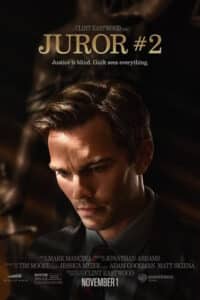
Juror #2
Alright, here’s the scoop. Justin Kemp’s got a bit of a wild past with alcohol but is trying to get his act together because he’s about to become a dad. His wife is expecting their little girl pretty soon, so things are serious. But then, right when he doesn’t need any more drama, he’s picked for jury duty on this messy murder case near Savannah, Georgia.
The victim is Kendall Carter—sounds like she got into it with her boyfriend and ended up dead in a ditch. The boyfriend is in trouble again too since he’s trying to leave his gang life behind. Everybody’s looking at him like he’s guilty because the county attorney’s also itching for a win; it’s election season after all.
Now here’s where it gets really twisted: Justin starts putting pieces together from his own cloudy memories and faces this gut-punch of a realization. Turns out, that night last year when he thought he’d crashed into a deer during bad weather? He might actually be the one who hit Kendall by accident!
He’s torn up inside between coming clean or keeping quiet about it all—meaning either letting an innocent guy take the fall or risking everything about his new life by confessing.
Meanwhile, picture this: Justin sets up the baby’s room as surprise for his wife, who’s blissfully unaware of what’s hanging over them both. You get to see her moment through the camera lens as she looks at him—the “better man,” or so everyone thought.
And even at 94 years old, director Clint Eastwood doesn’t mess around—he dives straight into Justin’s tangled web right from the start without any fluff whatsoever! Yeah… things just keep getting stickier from there in good ol’ Juror Number 2 fashion!
Alright, so this movie’s got a lot going on with people not really seeing what’s right in front of them. You’ve got a bride who’s literally blindfolded, a main character kind of lost in a storm, and others who are just too caught up in their own stuff to notice what’s really happening. It’s like these characters are all missing the obvious while everything’s nice and bright around them.
The story digs into the American legal system, especially how they pick jurors for trials. You know, those twelve folks who need to decide if someone’s guilty or not? And it feels like it takes a page from Sidney Lumet’s book with movies about jurors. There’s this twist where the best juror—like Henry Fonda style—is actually the one who might be guilty. Yep, that’s right! The film flashes back to show us that maybe juror number 2 is up to no good.
It’s not all about some big moral question but rather if we can even see what’s truly happening to deal with morals properly. Eastwood sets up this deep dive into doubt and guilt among these jurors without giving anything away since you could catch most of it right from the get-go anyway!
In Jonathan Abrams’ story, instead of keeping us guessing about the future, it cleverly builds a different kind of tension. As time ticks away, we watch as Justin, overwhelmed by guilt, tries to sway the jury’s quick decision to label the accused guilty.
It’s like we’re in some serious showdown right before midnight—justice thinks it’s doing its thing, and even the cops are involved. There’s this retired officer too; he had to step back because he couldn’t really play fair. J.K. Simmons is great for reminding us of those classic Clint Eastwood cop vibes—like they’re always bending the rules just a bit too much. But then he fades out and what we’re left with is one particular juror who knows way more than they probably should about how this whole thing ends.
The whole scene is tangled up with all these personal stories and mixed feelings among the jurors—a young woman itching for revenge against sexism or another who’s got her own family history marked by gang violence. Everyone’s chasing some idealistic dream but are also grappling with their own baggage. It’s a real mix of emotions and motives that gives everything a complicated edge.
Certainly! Just let me know which movie description you’d like me to rewrite, and I’ll be happy to help.
To watch movies and TV shows online, please sign up with our partner, a legit streaming service.
Get Started ➔






